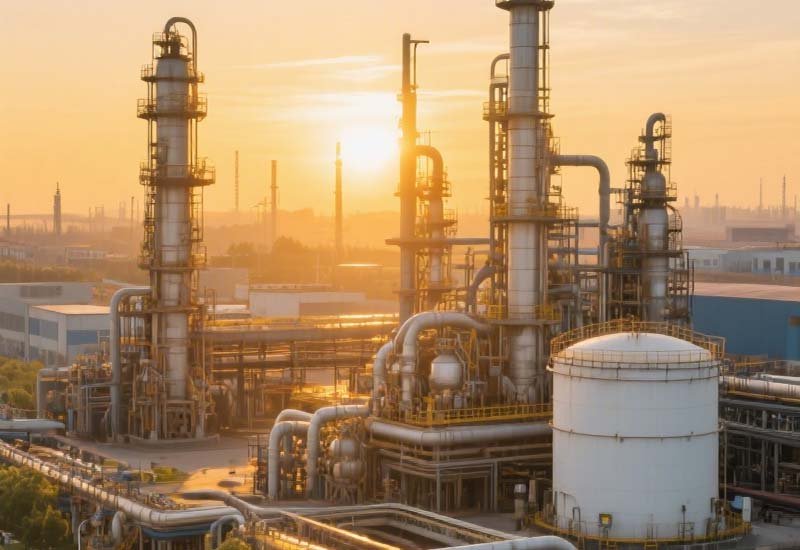Advanced Petrochemical Fastener and Industry Solutions
Petrochemical fasteners are essential components specifically designed to withstand the demanding conditions of chemical processing environments. In the petrochemical industry, fasteners play a critical role in ensuring the integrity and safety of equipment operating under extreme pressure, high temperature, and corrosive environments such as H₂S exposure and offshore platforms. Proper selection of fasteners directly impacts the reliability of pipelines, reactors, pressure vessels, and valve systems.

Fastener Performance Requirements
Petrochemical fasteners plants must be high-strength, corrosion-resistant, and compliant with global standards such as ASTM, ASME, and API. Common materials include alloy steel, stainless steel (304/316), and coated carbon steel to ensure long-term performance in harsh environments. Flybear’s fasteners are engineered to provide exceptional sealing, load-bearing strength, and resistance to thermal stress.
Recommended Fasteners & Typical Applications
- B7 Stud Bolts (Alloy Steel): Used in pressure vessel flanges and pipe connections exposed to high pressure and heat.
- 2H Heavy Hex Nuts (Carbon Steel): Commonly paired with stud bolts for bolted flange joints in refineries and gas processing units.
- Flange Face Bolts (PTFE-coated Carbon/Alloy Steel): Applied in flange assemblies requiring chemical resistance and sealing performance.
- High-Pressure Hex Bolts (Quenched & Tempered Alloy Steel): Ideal for heat exchangers, steam systems, and reactors.
- Threaded Rods (304/316 Stainless Steel): Used in support structures, cable trays, and suspended pipe systems in corrosive zones.
- Sealing Washers (SS + Rubber/PTFE): Provide leak-tight sealing for instrumentation and pressure sensors.
Corrosion Protection Technologies for Petrochemical Fasteners
Effective corrosion protection is a critical requirement for fasteners deployed in aggressive petrochemical environments. Aside from material selection, applying protective coatings enhances resistance to corrosive agents such as hydrogen sulfide, chlorides, and salt-laden offshore atmospheres. Common surface treatments used in Flybear fasteners include hot-dip galvanizing, PTFE/Xylan coatings, zinc-nickel plating, and phosphate coatings. These treatments not only extend service life but also reduce maintenance frequency and improve assembly efficiency by minimizing galling and thread seizure.
Flybear continually innovates in surface engineering to meet the evolving needs of petrochemical applications. Our in-house coating facility allows for customized protective layers tailored to each project’s exposure level and operating temperature. Additionally, coating thickness and adhesion are tested to industry benchmarks to ensure consistent field performance.
Flybear Quality Assurance
At Flybear, we place product quality and consistency at the core of our manufacturing process. Our factory is equipped with comprehensive fastener testing facilities, including hardness testing, tensile and shear strength testing, salt spray corrosion testing, thread gauges, metallographic analysis, and more. Every fastener is rigorously inspected to meet or exceed industry standards.
With over 20 years of experience serving global petrochemical clients, Flybear provides custom fastener solutions to support your project requirements with high reliability, fast delivery, and long-lasting performance.
Applications in the Petrochemical Industry
- Pipeline flange connections – Fasteners such as bolts, nuts, and washers are critical in securing pipeline flange joints that transport crude oil, gas, and refined products. These connections must maintain a leak-proof seal under high pressures, extreme temperatures, and corrosive environments.
- Pressure vessels and heat exchangers – High-strength fasteners are used to assemble and maintain the structural integrity of pressure vessels and heat exchangers. These components encounter significant thermal cycling and internal pressure, requiring dependable fastening solutions to ensure safe operation.
- Refinery reactors and separators – Bolts and studs are essential for connecting reactor components, closure heads, and internal supports, often exposed to aggressive chemicals and high operating temperatures. Reliability and corrosion resistance of fasteners are vital for continuous refinery operations.
- Gas processing skid systems – Skid-mounted processing units use fasteners to assemble frameworks, pipes, and control equipment. These units must be modular and transportable, requiring fasteners that can withstand vibration, environmental factors, and repetitive disassembly.
- Offshore platforms and subsea assemblies – In marine environments, fasteners are subjected to high salinity, hydrostatic pressure, and dynamic loading. Specialized corrosion-resistant materials such as stainless steel, Inconel, or titanium are employed in subsea trees, risers, and platform structures.
- Instrumentation and sensor mounting – Accurate placement and secure attachment of sensors and gauges are critical for monitoring pressure, temperature, and flow in process lines. Precision fasteners help maintain alignment and ensure the functionality of control instrumentation in harsh operating environments.
Explore Fastener Solutions for Other Industries
Beyond the petrochemical sector, Flybear offers engineered fastener solutions tailored for a wide range of industries with demanding operational environments. Each industry presents unique challenges, and Flybear’s technical expertise ensures optimal material selection, precision manufacturing, and corrosion protection strategies appropriate for every application.





